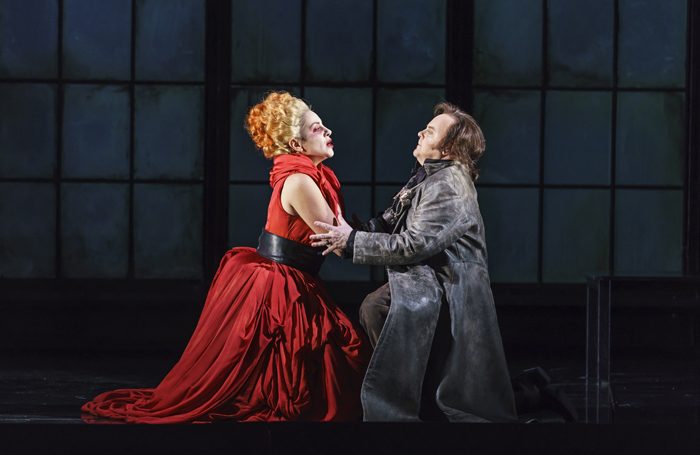 United Kingdom Donizetti, Roberto Devereux: Soloists, Chorus and Orchestra of Welsh National Opera / James Southall (conductor). Theatre Cymru, Llandudno, 25.4.2019. (RJF)
United Kingdom Donizetti, Roberto Devereux: Soloists, Chorus and Orchestra of Welsh National Opera / James Southall (conductor). Theatre Cymru, Llandudno, 25.4.2019. (RJF)

Production:
Director – Alessandro Talevi
Designer – Madeleine Boyd
Lighting designer – Matthew Haskins
Movement director – Maxine Braham
Cast:
Elisabeth, Queen of England – Joyce El-Khoury
Sara, Duchess of Nottingham – Justina Gringytė
Roberto Devereux, Earl of Essex – Barry Banks
Duke of Nottingham – Biagio Pizzuti
William Cecil – Robyn Lyn Evans
Page – George Newton-Fitzgerald
Gualtiero Raleigh – Wyn Pencarrig
Nottingham’s Confidant – Philip Smith
When David Pountney took charge of Welsh National Opera he conceived the idea of themes for each season. With vast experience in the opera field he knows the what, why and when in respect of opera periods and dates of premieres. A natural theme for anyone with his diversity of experience was Donizetti’s Elizabethan trilogy of Anna Bolena (1830), Maria Stuarda (1835) and Roberto Devereux (1837). Why reprise this particular opera in the autumn of his stay at WNO? Maybe he identifies more with the later, musically more mature period of the composer’s creative life or the wider concept of spiders and their webs around the professional stage.
Roberto Devereux was written in the most fraught period of the Donizetti’s personal life that saw another stillborn child, the third consecutive post partum death his wife had suffered. Worse was to follow with her demise a few weeks later from the complications of measles. (Both deaths were possibly related to the syphilis that Donizetti carried, and doubtless transmitted to his wife before the tertiary stage of the disease caused his own mental deterioration, paralysis, institutionalisation and early death, aged only 51, ten years later.) Along that fraught path had been his creation of his most popular work Lucia di Lammermoor in 1835. With the popularity of that work came opportunities for his growing compositional musical maturity evidenced between Lucia and Roberto. Add his growing dissatisfaction with Naples and looking towards France with its better musical standards and financial remuneration, it was a period of rapid change in musical maturity and idiom and this as clearly evidenced by the dramatic music of Roberto Devereux where vocal display comes second to dramatic aptness and effect.
Director Alessandro Talevi had been responsible for the first of the trilogy in 2015 as well as Roberto Devereux. His hallmarks are all over this production in which his idea is related to spiders. Act I opens with a largely bare stage except for a back-lit aquaria in which arachnids wonder, their images seen on the front glass, quite creepy! That is the theme of the last act in an altogether different way and context involving Queen Elisabetta (Elizabeth) sitting high on her throne at the apex of the body of a metallic spider whose long tentacle-like legs are manipulated by stage hands as she surveys her countrymen and their unhappy lot, and hers also as she learns of the death of the man she loves. In simple form the plot concerns variations on a normal operatic love triangle. Elisabeth loves Roberto, who in turn loves Sara. The Queen forced Sara to marry the Duke of Nottingham whilst Roberto was away fighting in Ireland. On his return Roberto is accused of treachery and threatened with death by Parliament. The Queen assures him that if ever his life is in danger he has only to return a ring she had given him so as to ensure his safety. Roberto subsequently gives the ring to Sara in an exchange of tokens. Her husband, who believes her guilty of infidelity with his erstwhile friend, prevents Sara from delivering it to the Queen. Meanwhile in a powerful prison scene Roberto awaits his release on delivery of the ring. By the time the Queen discovers the reason for the ring’s non-arrival Roberto has been executed. In a perversion of history, as Elisabeth despairs at the execution of Roberto, she concedes her throne to James the First of England.
There is plenty of body in Donizetti’s music to encompass the high drama of the story albeit the conductor in this performance lets volume take over rather unnecessarily from time to time. Of the singers, Barry Banks takes the title role. A high tenor, I first heard him as a student at the RNCM way back in the early 1980s singing a tastefully toned Almaviva in Rossini’s Il barbiere di Siviglia. Whilst his high tenor has been heard in bel canto roles at some of the best operatic addresses worldwide, his vocal tone is now somewhat bleached, and his small stature more obvious and – I regret to write – that he is less than convincing in this title role as a result. As his rival, the Duke of Nottingham, Biagio Pizzuti brings a sturdy Italianate voice and a well-acted interpretation, responding with vocal nuance and biting delivery to the words of the libretto as the drama of the story unfolds. As his wife, Sara, Justina Gringytė quietly portrays the dilemmas, fears and horrors that the role demands albeit with moments of unevenness. However, standing head and shoulders vocally above all the cast was the singing, and acting, of Joyce El-Khoury as Elisabeth. Her acting of the role was good whilst her singing was simply terrific. It is worth a journey to just see and hear her in this role. I am certain the best operatic addresses are already noting her development. The minor roles of Cecil and Raleigh were well acted and sung by Robyn Lyn Evans and Wyn Pencarrig.
Robert J Farr
